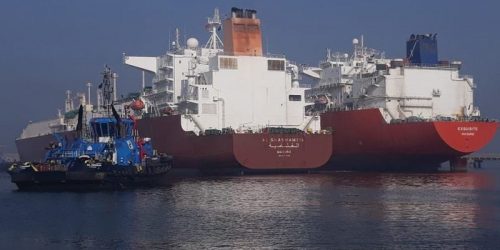ISLAMABAD: The Cabinet Committee on Energy (CCoE) on Thursday did not immediately allow reduction in port charges on handling of liquefied natural gas (LNG) demanded by the Petroleum Division and ordered an independent assessment to reach a decision on charges competitive in the region.
At a meeting of the CCoE presided over by Minister for Planning and Development Asad Umar, the Petroleum Division complained that Port Qasim Authority (PQA) had been handling charges on LNG vessels that were the highest in the region and yet was not spending these funds to improve infrastructure, resulting in traffic blockades.
A Petroleum Division official told Dawn that it had moved a summary to the CCoE suggesting charges that were comparable in the region and should not be $2 per gross registered tonnage (GRT) to begin with.
It also demanded that about $50 million collected on LNG handling should immediately be utilised for widening and deepening of the channel before collecting additional Channel Development Charges (CDC).
It reported that PQA had been receiving port charges for handling imported LNG vessels which are among the most expensive in the region.
The main components of the port charges included pilotage, towage, and the CDC.
Pilotage charges stood at $3.7 GRT, besides $100,000 per vessel of CDC. “The total charges per LNG cargo range from $600,000 to $750,000 which is 300pc more than the average of other regional ports,” the Petroleum Division said, adding these charges contribute to an approximately Rs7 per unit increase in the price of LNG.
It was reported that Pakistan State Oil (PSO) and Pakistan LNG Ltd (PLL) – the two LNG importers – were of the view that the CDC was collected for the first 200 LNG carriers for channel widening and dredging, but PQA had now communicated that it will continue charging the CDC until the complete recovery of its investment cost. However, the investment or project cost and an update on dredging and widening of the channel was not provided by PQA.
The Petroleum Division said a total of $47.5m CDC had been collected till Feb 7, 2021 for infrastructure development at Port Qasim but the passage of LNG vessels in the channel continued adversely affecting the movement of the other ships.
“All traffic in the channel stops when an LNG vessel is moving. Due to unavailability of night navigation, charter cost is affected which is ultimately reflected in price of LNG.
Both state-owned PSO and Pakistan LNG Ltd (PLL) are importing LNG through two LNG regasification terminals of Engro Elengy and Pakistan Gasport established with the guarantees of the Government of Pakistan.
PSO started importing LNG in March 2015 on the first LNG Terminal of Engro and has so far imported a total of 359 LNG cargoes.
PLL also started importing LNG on the 2nd LNG Terminal of Pakistan Gasport in 2017 and imported a total of 136 cargoes.
The Petroleum Division said the PQA had agreed to cut the towage rate to $4.199 per GRT from $5.913 on Feb 1, 2017 and further to $3.706 per GRT on June 13, 2018, but did not implement these rates.
The summary demanded starting from March 2015 to February 2018, the revised reduction in tariff should be applied for the entire three-year period both retrospectively and prospectively.
It demanded setting the PQA LNG pilotage and towage rates at a comparable level to the rates of ports in the region, effective from March 2015, and that number should not be more than $2 per GRT.
Also, the PQA should utilise the already collected CDC for widening and development of the channel, before collecting additional CDC and an independent evaluation should be carried out for an optimally competitive GRT rate post 2021 when private terminals are also likely to start-up.
The CCoE “approved the proposal to conduct an independent assessment for better competitive rates” and “noted that rationalisation of various charges at the port will benefit the end consumers, through reduction in cost of LNG”, said an official statement.
It directed Ministry of Maritime Affairs to immediately start infrastructure development work, using the financial resources available with PQA and the desired improvement in port infrastructure and facility should be the single priority of Port Qasim Authority.





